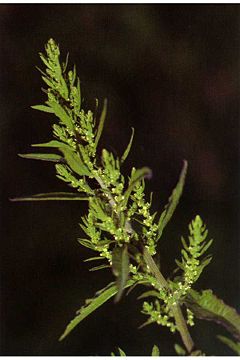Dysphania ambrosioides
2008/9 Schools Wikipedia Selection. Related subjects: Plants
| Epazote | ||||||||||||||
|---|---|---|---|---|---|---|---|---|---|---|---|---|---|---|
 |
||||||||||||||
| Scientific classification | ||||||||||||||
|
||||||||||||||
| Binomial name | ||||||||||||||
| Dysphania ambrosioides (L.) Mosyakin & Clemants |
||||||||||||||
| Synonyms | ||||||||||||||
|
Chenopodium ambrosioides |
Epazote, Wormseed, Jesuit's Tea, Mexican Tea, or Herba Sancti Mariæ (Dysphania ambrosioides, formerly Chenopodium ambrosioides) is an herb native to Central America, South America, and southern Mexico. It is an annual or short-lived perennial plant, growing to 1.2 m tall, irregularly branched, with oblong-lanceolate leaves up to 12 cm long. The flowers are small and green, produced in a branched panicle at the apex of the stem. The common Spanish name, epazote is derived from the Nahuatl epazōtl (pronounced [eˈpasoːtɬ]).
As well as in its native areas, it is grown in warm temperate to subtropical areas of Europe and the United States ( Missouri, New England, Eastern United States), sometimes becoming an invasive weed.
Epazote comes from nahual word Epazotl which is the compound word Epatl and Zotl meaning skunk sweat.
Culinary uses
Epazote is used as a leaf vegetable and herb for its pungent flavor. Raw, it has a resinous, medicinal pungency, similar to the liquorice taste of anise, fennel, or even tarragon, but stronger. Epazote's fragrance is strong, but difficult to describe. It has been compared to citrus, petroleum, savory, mint and putty.
Although it is traditionally used with black beans for flavor and its antiflatulent properties, it is also sometimes used to flavor other traditional Mexican dishes as well: it can be used to season quesadillas and sopes (especially those containing huitlacoche), soups, mole de olla, tamales with cheese and chile, chilaquiles, eggs and potatoes and enchiladas.
Medicinal uses
Epazote is used as a leaf vegetable and herb for its pungent flavor and its claimed ability to prevent flatulence caused by eating beans but also in the treatment of amenorrhea, dysmenorrhea, malaria, chorea, hysteria, catarrh, and asthma.
Oil of chenopodium is derived from this plant. It is anthelmintic, that is, it kills intestinal worms, and was once listed for this use in the US Pharmacopoeia. It is also cited as an antispasmodic and abortifacient - the first birth control pills were derived from research on epazote.
Epazote essential oil contains ascaridole (up to 70%), limonene, p-cymene, and smaller amounts of numerous other monoterpenes and monoterpene derivatives ( α-pinene, myrcene, terpinene, thymol, camphor and trans-isocarveol). Ascaridol (1,4-peroxido-p-menth-2-ene) is rather an uncommon constituent of spices; another plant owing much of its character to this monoterpene peroxide is boldo. Ascaridole is toxic and has a pungent, not very pleasant flavor; in pure form, it is an explosive sensitive to shock. Allegedly, ascaridole content is lower in epazote from México than in epazote grown in Europe or Asia.